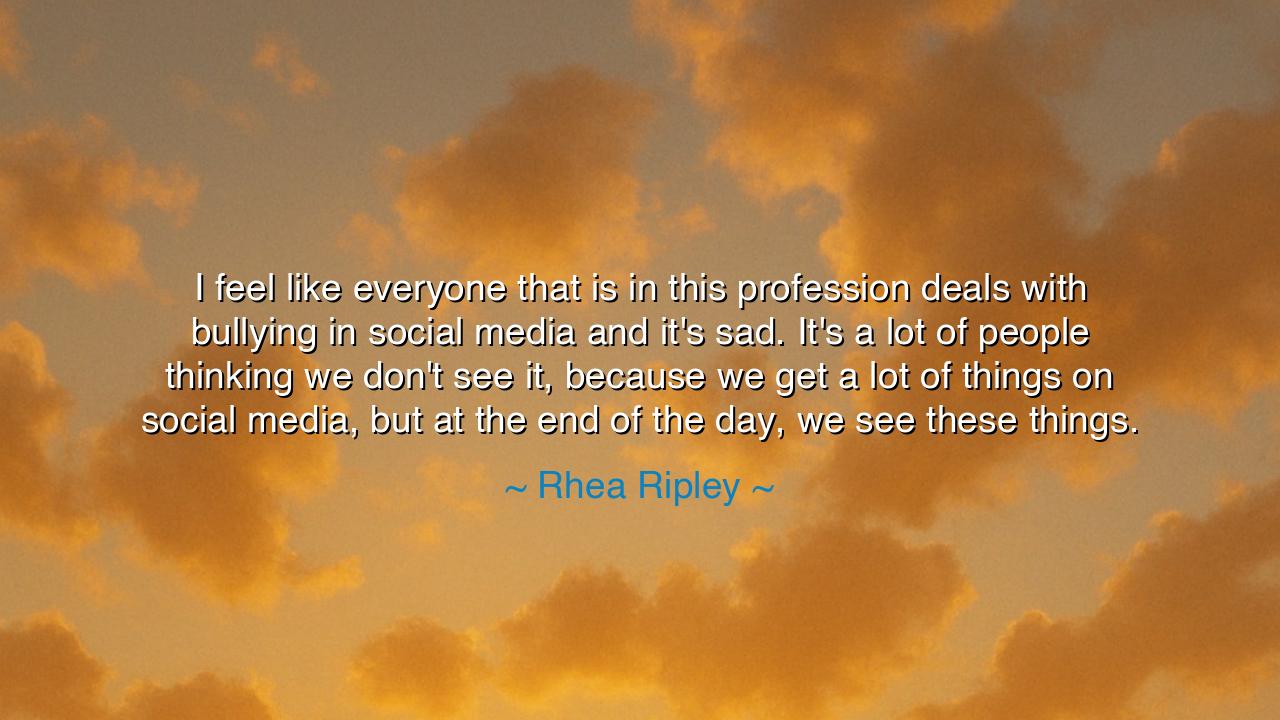
I feel like everyone that is in this profession deals with
I feel like everyone that is in this profession deals with bullying in social media and it's sad. It's a lot of people thinking we don't see it, because we get a lot of things on social media, but at the end of the day, we see these things.






The words of Rhea Ripley echo like the lament of a warrior who bears scars not only from battles fought in the arena but also from unseen arrows cast in the silence of the night. She speaks of bullying on social media, of cruel tongues clothed in anonymity, of daggers hurled from the shadows that pierce the spirit more than the flesh. Her cry is not only her own—it is the cry of all who have stood exposed to the masses, only to be struck by those who take delight in cruelty. The ancients would have said: “The spear that is seen may be dodged, but the spear that comes unseen is the one that fells the mightiest.”
For in her words—“we see these things”—there is a truth that many forget: no matter how high the pedestal, the one who stands upon it still has a heart. The applause of thousands may roar, but the whisper of a single cruel voice can echo louder in the soul. The heroes of old knew this well. Achilles, though blessed by the gods, was undone not by his strength’s failing but by the wound to his heel. So too, those who shine in the public eye are undone not by their lack of courage, but by the constant chipping of unseen voices upon their humanity.
Consider the tale of Abraham Lincoln, who bore both the burden of leading a nation through civil war and the venom of countless critics. His enemies mocked his appearance, called him unfit, and sought to humiliate him at every turn. Yet Lincoln pressed forward, carrying his grief in silence. In the end, his legacy endured not because he was spared cruelty, but because he endured it with purpose. In this, we see the living reflection of Ripley’s words—the pain is seen, the wounds are felt, yet the path must continue.
There is also an ancient wisdom hidden in this lament: the reminder that the human eye sees more than the human mouth admits. The bully believes their words vanish into the void, but the one targeted absorbs them like arrows to the shield. Words are never weightless. They carve marks upon the soul. The Stoics warned us: guard the tongue, for the tongue can heal or destroy more swiftly than the sword. Rhea Ripley, knowingly or not, joins this chorus of ancient wisdom by proclaiming that every cruel word leaves its trace.
Yet within her grief there is also strength. To confess that “we see these things” is not to surrender, but to reveal the battlefield honestly. It is to remind the world that those who stand before us—be they warriors in the ring, poets on the stage, or leaders in the court—are flesh and blood, not marble statues. To acknowledge pain is the first step to wielding it as fire. Many who hear her words may find solace, realizing that even the mighty are wounded, and in that shared humanity there is courage.
The lesson to carry forth is clear: we must wield our voices not as weapons but as instruments of honor. To cast cruelty is easy, but to speak truth with kindness is the mark of greatness. In our age, where words fly faster than arrows across the endless field of social media, each person must choose: will you be the poison in another’s cup, or the water that refreshes them? Will you scatter stones in another’s path, or clear the road so they may walk stronger?
Therefore, let us be vigilant guardians of the tongue and the pen. When tempted to mock, let us instead encourage. When angered, let us pause before we strike with words we cannot recall. And when we see another under fire, let us not stand silent, but shield them as we would a brother or sister. In this way, we honor the truth hidden in Ripley’s lament: that though the eyes of the mighty see the cruelty of the world, they may also see our compassion.
Remember then, O reader: your words have power. Use them not to tear down, but to build. For if even the strongest among us, like Rhea Ripley, can be wounded by unseen arrows, then surely your kindness can be the balm that heals. This is the teaching passed down: be the shield, not the spear; be the healer, not the destroyer. In this way, the world shall be made brighter, and those who stand in the light will no longer have to fight the shadows alone.






AAdministratorAdministrator
Welcome, honored guests. Please leave a comment, we will respond soon